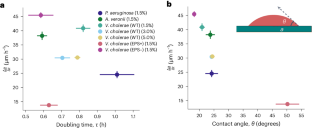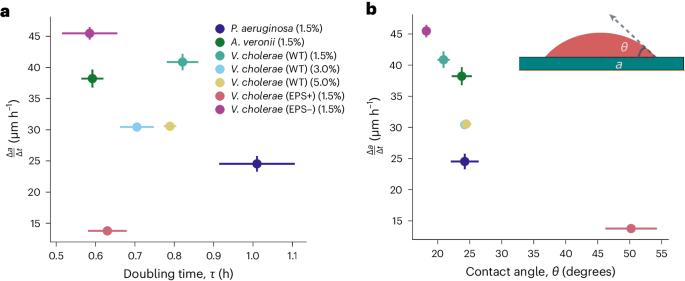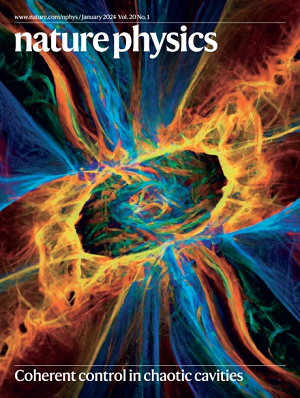The biophysical basis of bacterial colony growth
IF 17.6
1区 物理与天体物理
Q1 PHYSICS, MULTIDISCIPLINARY
引用次数: 0
Abstract
Bacteria often attach to surfaces and grow densely packed communities called biofilms. As biofilms grow, they expand across the surface, increasing their surface area and access to nutrients. Thus, the overall growth rate of a biofilm is directly dependent on its range expansion rate. A direct trade-off between horizontal and vertical growth impacts the range expansion rate and, crucially, the overall biofilm growth rate. The biophysical connection between horizontal and vertical growth remains poorly understood, in large part due to the difficulty in resolving the biofilm shape with sufficient spatial and temporal resolutions from small length scales to macroscopic sizes. Here we show that the horizontal expansion rate of bacterial colonies is strongly coupled to vertical expansion via the contact angle at the biofilm edge. Using white light interferometry, we measure the three-dimensional surface morphology of growing colonies, and find that small colonies are well described as spherical caps. At later times, nutrient diffusion and uptake prevent the tall colony centre from growing exponentially. We further show that a simple model connecting vertical and horizontal growth dynamics can reproduce the observed phenomena, suggesting that the spherical cap shape emerges due to the biophysical consequences of diffusion-limited growth. The growth of a biofilm—a bacterial colony attached to a surface—is governed by a trade-off between horizontal and vertical expansion. Now, it is shown that this process significantly depends on the contact angle at the biofilm’s edge.


细菌菌落生长的生物物理基础
细菌经常附着在物体表面,生长出密集的群落,称为生物膜。随着生物膜的生长,它们会向整个表面扩展,增加表面积和获得养分的机会。因此,生物膜的整体生长速度直接取决于其范围扩张速度。横向生长和纵向生长之间的直接权衡会影响范围扩展率,更重要的是会影响生物膜的整体生长率。人们对水平生长和垂直生长之间的生物物理联系仍然知之甚少,这在很大程度上是由于从小规模长度尺度到宏观尺寸的生物膜形状难以得到足够的空间和时间分辨率。在这里,我们展示了细菌菌落的水平扩展速率通过生物膜边缘的接触角与垂直扩展密切相关。我们利用白光干涉测量法测量了生长中菌落的三维表面形态,发现小菌落可以很好地描述为球形菌盖。后来,营养物质的扩散和吸收阻止了高大菌落中心的指数增长。我们进一步证明,一个连接垂直和水平生长动力学的简单模型可以再现观察到的现象,这表明球形帽形状的出现是由于扩散受限生长的生物物理后果。
本文章由计算机程序翻译,如有差异,请以英文原文为准。
求助全文
约1分钟内获得全文
求助全文
来源期刊

Nature Physics
物理-物理:综合
CiteScore
30.40
自引率
2.00%
发文量
349
审稿时长
4-8 weeks
期刊介绍:
Nature Physics is dedicated to publishing top-tier original research in physics with a fair and rigorous review process. It provides high visibility and access to a broad readership, maintaining high standards in copy editing and production, ensuring rapid publication, and maintaining independence from academic societies and other vested interests.
The journal presents two main research paper formats: Letters and Articles. Alongside primary research, Nature Physics serves as a central source for valuable information within the physics community through Review Articles, News & Views, Research Highlights covering crucial developments across the physics literature, Commentaries, Book Reviews, and Correspondence.
 求助内容:
求助内容: 应助结果提醒方式:
应助结果提醒方式:


